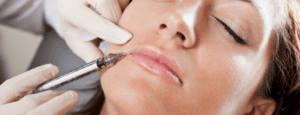Dermal Filler

The term “dermal fillers” encompasses a wide range of products, and is an expression which describes treatment that restores volume and structure to the face. Dermal fillers work to smooth fine lines and wrinkles, crepey skin and address signs of ageing. The high levels of HA (hyaluronic acid a natural ingredient that is found in the body) have the effect of attracting and retaining water, instantly improving the skin’s appearance and texture by restoring its natural plumpness. They are a popular means of restoring volume to the facial structure, creating a more youthful and rejuvenated appearance. Hyaluronic Acid Dermal Fillers are the natural way to smoother, plumper skin. The product can also be used to contour and define areas of the face such as the jawline, chin and cheek area. Fillers for the face can be used on a wide range of patients, and are primarily used for skin rejuvenation and the reduction of lines and wrinkles. They can also be used to treat scarring in some cases. Other suitable candidates are those seeking to add structure and volume to the face. There is no known risk to those who are pregnant or breast feeding, but we would advise against having treatment under these circumstances.
Procedure time: 30-60 minutes
Pain: Mild Discomfort
Anaesthetic: Topical anaesthetic cream/ dental block
Full Recovery: 2-7 days depending on area
Results duration: 6-12 Months
Risks: Bruising, swelling, tenderness, lumps, asymmetry
Most commonly treated areas:
Fillers can be used to volumise, shape, rejuvenate or smooth the skin on the face, hands and décolletage.
The most common areas we treat are the cheeks, nasolabial lines (nose to mouth), marionette lines (below the mouth), lips, tear trough and jowls. There are different fillers depending upon the area to be treated, ranging from hydrating fillers which are perfect for the décolletage, smooth fillers ideal for the lips or denser fillers for volumising which are most suitable for the cheeks. Often, a combination of areas and fillers are used to achieve the perfect result.
PRICING:
Lip Augmentation
0.5ml: £205
1ml: £275
Nasolabial/ Marionette lines
0.5ml: £205
1ml: £275
Cheek / Jawline/ Tear Trough
1ml: £275
2ml: £550
3ml: £825
Hyalase (dissolving agent)
£150
What are Dermal Fillers?
Dermal fillers are used for facial aesthetic treatments and are injected into the skin. They are designed to effectively reduce the appearance of unwanted wrinkles, contour and create volume, and to revitalize the skin. Dermal fillers are based on Hyaluronic Acid which is a substance that naturally exists in your body.
The result of a single treatment can be seen instantly and can last for around 6 to 12 months. Dermal filler injections can give a natural looking result that does not affect facial expression.
How does it work?
Using a tiny needle, the filler product is injected into the skin or just below it depending on the area being treated. The filler plumps up the layers of skin immediately beneath the area and the result is an instant filling-out effect so that the skin is smoother, less wrinkled and more youthful.
Is it safe and does it hurt?
We only use fillers with a proven track record for safety and so you can be assured that they are safe. We do not treatment anyone who is pregnant or breastfeeding and those with active skin infections such as cold sores. The injection may sting and can be slightly painful, but many people experience only mild discomfort. Anesthetic creams and/or injections can be used. Although most of the injectables we use already have a numbing agent in, this is called Lidocaine.
Side Effects
Since the products are hypoallergenic gels, allergic reactions are extremely rare. Side effects are uncommon but can occur, and include bruising, tenderness, reddening, and occasionally itching.
There is usually a little swelling immediately after treatment but in most cases it is very mild. If any of these do occur they usually settle within a week.
Bruising can sometimes be significant and last no more than a week, it is best to avoid anti-inflammatory (aspirin, ibuprofen) for at least 7 days before treatment, unless these have been prescribed for a medical indication. Alcohol within the previous 24 hours can also increase the risk of bruising. Treatments are only carried out after a full medical history has been undertaken.
Aftercare:
Post treatment: Immediately after treatment there may be some swelling, redness, itching and tenderness. This is a normal result of the injection and will settle.
The swelling may remain for up to a week, the other symptoms usually settling more quickly. After injections to enhance lips, the swelling can persist for a week or more. During this time the lips can look uneven and so it is important to understand that the result immediately after injection will not always be the final result.
Bruising can be quite marked in some instances and the application of ice following treatment may reduce this.
Avoid applying make-up for 24 hours to the treated area – this is especially important for the lips.
If you have had cold-sores in the past there is a risk that the needle punctures can cause another eruption – you may need some tablets or cream from the practitioner who treated you to prevent this.
Hyaluronic filler treatments (Juvederm, Restylane, Teosyal) may last from 4 months up to 12 months, depending on the area treated, age, skin-type, lifestyle and muscle activity.
Fillers are broken down through the body’s natural processes and there are no permanent effects.
